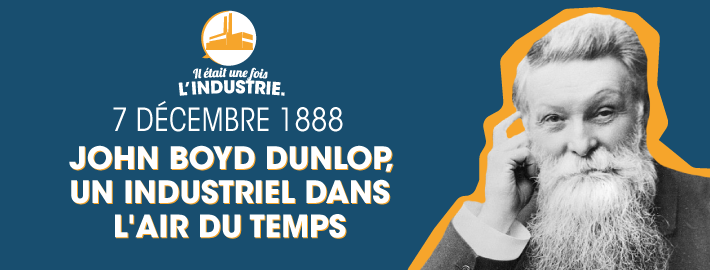GLOBAL
INDUSTRIE
News
Share on

7 December 1888: John Boyd Dunlop, an industrialist who remolded the
This week, let’s take a look at a truly pumped-up Scottish inventor who, exactly 133 years ago, filed a patent that was to revolutionize a transport world which was itself undergoing profound changes: the pneumatic tire.
AN IRISH BALLAD
John Boyd Dunlop was born on the 5th of February 1840 on a farm in Dreghorn, Scotland. His natural curiosity and intelligence won him a place at the prestigious University of Edinburgh, where he qualified as a veterinary surgeon. He practiced this profession for around ten years in his home area before leaving in 1867 to pursue his career in Ireland, where he settled for the rest of his life.
He began by founding a veterinary surgery with his brother in Downpatrick before moving it to Belfast. This was quickly to become one of the country’s biggest veterinary practices. He married there in 1871 and became the happy father of a girl and a boy. It was the boy who indirectly enabled him to go down in history…
A SCOTTISH SKIRT
It was in fact to please this young tricycle lover that in 1887 he came up with the idea of surrounding the wooden wheels of his bike with rubber tubes filled with air. His aim was to simultaneously improve the machine’s comfort, quietness, speed and grip on the road.
It must nevertheless be acknowledged that one of his compatriots had had this idea no less than forty years before him: another Scotsman, William Thomson, had indeed filed a patent for an “air wheel”, a tire consisting of a rubber skirting glued onto a wheel rim. However, due to the fragility of his invention and the lack of markets for it at the time, he was obliged to abandon the patent, thus making John Dunlop, who was apparently unaware of his existence, "the right man in the right place"!
NOT SO MUCH DOUGH WITH DU CROS…
His pneumatic tire with a valve, for which he thus registered the patent on the 7th of December 1888, quickly spread beyond the bounds of his family garden and rapidly acquired a solid reputation in the fast-growing world of cycle races. It thus enabled Willie Hume, a native of Belfast, to win competition after competition all over the United Kingdom, including one snatched from under the noses of the sons of the Chairman of the Irish Cyclists’ Association, William Harvey du Cros.
The shrewd financier immediately understood the potential of this invention in a period which was simultaneously seeing the development not only of the bicycle but also of the automobile and the motorcycle. He therefore suggested to Dunlop that they team up to found a company in his name to exploit the patent. The Dunlop factory in Dublin thus became the first tire manufacturing plant in the world. However, as car tire production did not start until the beginning of the following century, Dunlop, who withdrew from the company in 1895 and died in Dublin on the 23rd of October 1921, at the age of 81, unfortunately did not make a fortune from his invention…
Although Dunlop became a subsidiary of its American rival Goodyear in 2003, it remains a legendary name in the production of tires and products derived from rubber, including the famous Dunlopillo mattresses. Its inventor can thus sleep easy…
"It’s better to be a flat tire than a burst tire." – Francis Blanche
OTHER EVENTS WHICH HAPPENED THIS WEEK:
- 6 December (1957): death of Robert Esnault-Pelterie, a pioneer of aircraft construction
- 7 December (1909): the Belgian chemist Leo Baekeland files a patent for a Bakelite, the first industrial plastic
- 7 December (1963): the Italian Montelli reaches an altitude of 6,700 meters in a glider
- 8 December (1931): patenting of the modern coaxial cable by the American engineer Herman Affel
- 8 December (1969): the Acadia Forest, the first “Kangaroo” ship, arrives in Rotterdam and delivers the 73 barges inside it on the Rhine
- 9 December (1901): birth of the aviation pioneer Jean Mermoz
- 9 December (1977): opening of the RER, the Île-de-France regional transport network
- 10 December (1799): in France, the law enshrines the first platinum standards for the meter and the kilogram as “defining measures of length and weight throughout the Republic"
- 10 December (1896): the Swedish chemist and industrialist Alfred Nobel dies of a stroke
- 10 December (1901): the first Nobel prizes are awarded
- 10 December (1993): end of the work on the Channel Tunnel
- 11 December (1967): presentation of the supersonic aircraft Concorde in Blagnac
- 11 December (1970): Renault distributes 542,000 shares to 45,600 of its employees
- 12 December (1901): first Transatlantic wireless signal transmission between Newfoundland and Cornwall by the Italian inventor Guglielmo Marconi
- 12 December (1915): the German aircraft engineer Hugo Junkers flies the first all-metal aircraft, the Junkers J1
- 12 December (2012): launch of the first North Korean observation satellit
2021.12.07